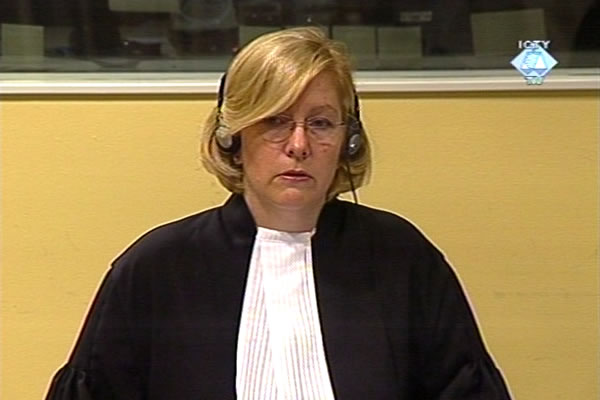Home
PROSECUTION: SESELJ’S CRIME SPEECH
Prosecution delivers its opening statement at the trial of Vojislav Seselj, Serbian Radical Party leader. According to the prosecution, Seselj contributed to the accomplishment of a joint objective: the permanent elimination of non-Serb population from the territory of the Greater Serbia, as it was envisaged. His contribution was the ‘fanatical and extreme rhetoric’ that fomented fear and hate among the Serbs and at the same time served to demonize and dehumanize Croats and Muslims
 Christine Dahl, prosecutor in the Seselj case
Christine Dahl, prosecutor in the Seselj case Describing Vojislav Seselj as ‘a skillful versed politician’, ‘a cunning and scheming man’ and ‘a scandal-monger’, prosecutor Christine Dahl contested Seselj’s right to call himself ‘the greatest living Serbian nationalist’. National pride, Dahl noted, doesn’t call for ‘fear, hate and destruction of other cultures and religions’. According to her, Seselj’s ‘chauvinist, belligerent and poisonous’ brand of nationalism is based exactly on these concepts.
Dahl delivered her opening statement today at the beginning of the trial of Serbian Radical Party leader on charges of war crimes and crimes against humanity in Croatia, BH and Vojvodina. The prosecution evidence will ‘demonstrate that Seselj committed crimes’ during the wars in the former Yugoslavia, she said. Seselj actively worked on the creation of a Greater Serbia – whose western border was to be the famous Karlobag-Ogulin-Karlovac-Virovitica line – together with Serbian leadership. Although Slobodan Milosevic shared the same goal, he never dared to call openly for the ‘liberation of the Serbian lands’. Seselj himself did gladly and as often as he could. Seselj wasn’t bothered by the fact that other ethnicities lived in those lands. Yet, in the end, Seselj failed to achieve the Greater Serbia, the prosecutor added. All he was able to achieve was ‘a lesser Serbia’ and the addition of a new phrase to the global vocabulary: ‘ethnic cleansing’.
The prosecution will prove that Seselj, together with other Serbian leaders, took part in a joint criminal enterprise whose objective was to eliminate forcibly and permanently the non-Serbian population from large areas in Croatia, BH and Vojvodina, Christine Dahl said. Seselj contributed to this goal with his ‘fanatical and extremist rhetoric’ that attracted and indoctrinated many young people. As volunteers, they came to the frontlines in Croatia and BH, and the Serbian Radical Party (SRS) drafted, financed, equipped, armed and commanded them.
These volunteers, known as ‘Seselj’s men’ or ‘Chetniks’, soon earned the reputation of ‘undisciplined and violent criminals and hoodlums’, although, as the prosecutor noted, they ‘served their leader's purpose’. Apart from his volunteers Seselj’s rhetoric of fear and hate ‘influenced other soldiers, volunteers and paramilitary troops’ fomenting fear and hatred against Croats and Muslim and a desire to contribute to the creation of the homeland of all Serbs – Greater Serbia.
Seselj’s hate speech ‘demonized and dehumanized’ both Croats and Muslim, painting them as ‘ustasha’ and ‘Muslim fundamentalists’, the prosecutor said. This served to eliminate all moral and legal restraints among his followers who then felt they could commit violence against them. The language he used ‘renders his speech criminal’. In the context of war and political turmoil, people were susceptible to the messages of fear and hate. Seselj, the prosecutor said, ‘was totally aware of his political power and his extraordinary ability to influence people with his speeches’. The prosecution intends to prove that Seselj committed the crime of persecution at least three times by his speeches: in Vukovar in November 1991, in Zvornik in the spring of 1992 and in the village of Hrtkovci in Vojvodina in the summer of 1992. Seselj’s speeches directly instigated the Ovcara massacre, the mass murders in Zvornik and the expulsion of Croats from the village of Hrtkovci.
[IMAGE]3071[/IMAGE]Seselj claims that he is being tried for ’a new or invented crime’, the prosecution pointed, but unfortunately, war propaganda and hate speech ‘are not new crimes’. The prosecution didn’t mention some earlier trials for the abuse of propaganda for criminal ends such as the trial of publisher Julius Streicher in Nurnberg in 1946. Streicher was sentenced to death for his calls for extermination of the Jews. In the ‘media case’ before the Rwanda Tribunal, three publishers and journalists were received life and long prison sentences in 2003 for ‘direct and public incitement to genocide’.
Vojislav Seselj often smiled ironically in the course of the prosecution’s opening statement. Tomorrow, he will deliver his own opening statement. While prosecutor Dahl used only three of the four hours she was allotted for the opening statement, Seselj indicated he would use his four hours.
Linked Reports
- Case : Seselj
- 2007-11-06 101 PROSECUTION WITNESSES TO TESTIFY AGAINST VOJISLAV SESELJ
- 2007-11-06 GENERAL LAZAREVIC FIRST TO TESTIFY IN HIS OWN DEFENSE
- 2007-10-26 JUDGE ANTONETTI WILL VISIT SESELJ
- 2007-11-08 UNAPPRECIATED PEACEMAKER
- 2007-12-11 SESELJ 'ADVOCATED AND JUSTIFIED VIOLENCE'
- 2007-12-12 COULD SESELJ BE PROSECUTED FOR HIS ’THREATENING DISCOURSE’ IN THE USA?
